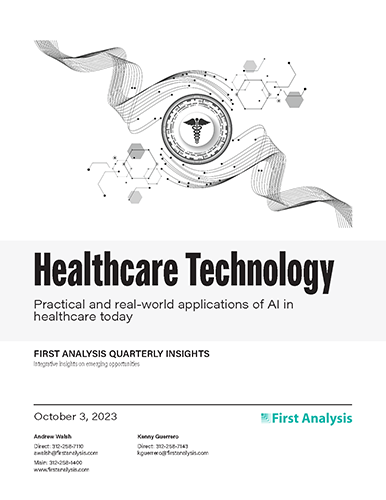Quarterly insights: Healthcare technology
Practical and real-world applications of AI in healthcare today

We explore the transformative effects ethical and clinically appropriate AI can have on patient experience and cost-saving efforts in healthcare, particularly in the administrative functions among payers and providers.
Among the administrative functions where AI can have the greatest impact are eligibility verification, prior authorization, and claims adjudication. AI can streamline these often routine and resource-intensive interactions among payers and providers, resulting in reduced administrative burden and significant cost savings for many healthcare stakeholders.
We examine AI’s potential in each of these three areas and highlight companies providing AI-based technology that can help payers, providers and other healthcare stakeholders realize this potential.
TABLE OF CONTENTS
Includes discussion of six private companies
- Exploring how AI can transform healthcare
- AI and its subcategories
- The ethical and clinically appropriate use of AI in healthcare
- Supporting clinical decision making with AI
- Cost-saving potential from AI in administrative activities
- Great potential for thoughtful and careful use of AI in healthcare
- Healthcare tech index left behind in broader index recovery
- Healthcare tech M&A: Notable transactions include HealthPay24 and TabulaRasa
- Healthcare tech private placements: Notable transactions include Sempre Health and NeuroFlow
Exploring how AI can transform healthcare
Clinical trials are the backbone of medical research, serving as a key bridge between drug development and patient care. As we have discussed in our previous reports, clinical trials are expensive and time consuming, and any delay pushes out the timeline for potential approval, meaning lost opportunities to improve patients’ lives and unrecoverable revenue. Supplying clinical trials with trial therapies, or investigational medicinal products (IMPs), is a pivotal part of the clinical trial process that can affect trials’ success, cost and speed. The critical nature of clinical trial supply management became especially apparent during the pandemic, which highlighted supply chain weaknesses in areas such as third-party logistics, forecasting, inventory visibility and staffing. With this in mind, pharmaceutical companies are increasingly turning to technology-based solution providers to handle some or all of their clinical trial supply needs.
AI and its subcategories
Clinical trials are the backbone of medical research, serving as a key bridge between drug development and patient care. As we have discussed in our previous reports, clinical trials are expensive and time consuming, and any delay pushes out the timeline for potential approval, meaning lost opportunities to improve patients’ lives and unrecoverable revenue. Supplying clinical trials with trial therapies, or investigational medicinal products (IMPs), is a pivotal part of the clinical trial process that can affect trials’ success, cost and speed. The critical nature of clinical trial supply management became especially apparent during the pandemic, which highlighted supply chain weaknesses in areas such as third-party logistics, forecasting, inventory visibility and staffing. With this in mind, pharmaceutical companies are increasingly turning to technology-based solution providers to handle some or all of their clinical trial supply needs.
Structured machine learning can use data like height, weight, diagnoses, treatment plans and procedures to predict how patients may respond to certain treatments, or it can use patient inflow data, bed occupancy data and staff availability data to predict how hospitals can best allocate resources.
Unstructured machine learning uses more nuanced data like medical images, handwritten medical notes, and discharge summaries to summarize and highlight years of clinical notes or help with medical image-based diagnosis by detecting abnormalities in magnetic resonance images and X-rays.
NLP manages and interprets unstructured data, bridging the gap between unstructured and structured machine learning models and facilitating more efficient data extraction and research.
Generative AI, likely the least adopted and newest application of AI in healthcare, uses frameworks like generative adversarial networks to generate novel data samples that are similar to input data by using two neural networks, the generator and the discriminator, where the generator has the goal to produce data that is indistinguishable from real data and the discriminator has the goal to distinguish between real and fake data produced by the other model. Over time, as the generator network receives feedback from the discriminator network, it becomes highly effective at generating data like the input data. While the use of generative AI in healthcare is still in its early stages, it could ultimately be used to generate more personalized care pathways, to simulate disease progression, or in treatment regimen simulation to better understand how different regimens may affect a patient.

Request full report
To access the full report, please provide your contact information in the form below. Thank you for your interest in First Analysis research.
